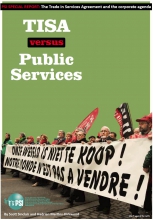Thursday, June 19, 2014
Book on Servicisation - downloadable!
This isb the bargain of the week:
Servitization in Industry
contents:
Contents
1 Introduction
........................................ 1
Gunter Lay
Part I Servitization by Sector
2 Photocopier Industry: At the Forefront of Servitization
........ 23
Filippo Visintin
3 Servitization in the Aircraft Industry: Understanding
Advanced Services and the Implications of Their Delivery
...... 45
Tim Baines and Howard Lightfoot
4 The Automotive Industry: Heading Towards Servitization
in Turbulent Times
.................................. 55
Paolo Gaiardelli, Lucrezia Songini and Nicola Saccani
5 Plant Engineering: Old Wine in New Skins
................. 73
Gunter Lay
6 Air Compressors or Compressed Air: Harvesting the Benefits
... 91
Peter Radgen
7 Machine Tool Industry: Beyond Tradition?
................. 109
Giacomo Copani
8 Chemical Industry: Servitization in Niches
................. 131
Daniela Buschak and Gunter Lay
9 Servitization of Capital Equipment Providers
in the Pulp and Paper Industry
.......................... 151
10 Manufacturers of Medical Technology: Servitization
in Regulated Markets
................................. 165
Marcus Schröter and Gunter Lay
Part II Servitization by Manufacturers’ Operational Departments
11 Servitization as an Innovation Process: Identifying
the Needs for Change
................................. 179
Christian Lerch
12 Acquiring Customer Knowledge to Enhance Servitization
of Industrial Companies
............................... 191
Taru Hakanen, Minna Kansola and Katri Valkokari
13 Market Research for Servitized Offerings: A Case Study
in the Chinese Province of Guangdong
.................... 211
Christian Lerch and Matthias Gotsch
14 Strategies for Developing the Service Business
in Manufacturing Companies
........................... 229
Jakob Ebeling, Thomas Friedli, Elgar Fleisch and Heiko Gebauer
15 Sourcing and Supplier Relationships
for Servitized Manufacturers
........................... 247
Nicola Saccani and Marco Perona
16 Servitization and Process Interfaces
...................... 263
Martin Spring and Juliana Santos
17 Avoiding the Overhead Cost Trap: Towards an Advanced
Management Accounting Method for Servitized Firms
......... 277
Christian Lerch and Matthias Gotsch
18 Adapting Products for Servitization
...................... 295
Sabine Biege
19 The Impact of Servitization on Key Competences
and Qualification Profiles in the Machine Building Industry
.... 315
Matthias Gotsch, Christiane Hipp, Petra Jung Erceg
and Nadezda Weidner
Part III Conclusions
20 Servitization by Sector and Manufacturers’ Operational
Departments: Lessons Learned
.......................... 333
Gunter Lay
Monday, June 02, 2014
Trade in Services Agreement (TISA)
Strong critique of process of developing Trade in Services Agreement (TISA), and its implications for public services:
http://www.world-psi.org/en/psi-special-report-tisa-versus-public-services
 A new report by Public Services International (PSI) warns that
governments are planning to take the world on a liberalisation spree on a
scale never seen before. According to the report, this massive trade
deal will put public healthcare, broadcasting, water, transport and
other services at risk. The proposed deal could make it impossible for
future governments to restore public services to public control, even in
cases where private service delivery has failed. It would also restrict
a government’s ability to regulate key sectors including financial,
energy, telecommunications and cross-border data flows.
A new report by Public Services International (PSI) warns that
governments are planning to take the world on a liberalisation spree on a
scale never seen before. According to the report, this massive trade
deal will put public healthcare, broadcasting, water, transport and
other services at risk. The proposed deal could make it impossible for
future governments to restore public services to public control, even in
cases where private service delivery has failed. It would also restrict
a government’s ability to regulate key sectors including financial,
energy, telecommunications and cross-border data flows.
http://www.world-psi.org/en/psi-special-report-tisa-versus-public-services

Treating
public services as commodities for trade creates a fundamental
misconception of public services. The Trades in Services Agreement
(TISA), currently being negotiated in secret and outside of World Trade
Organization rules, is a deliberate attempt to privilege the profits of
the richest corporations and countries in the world over those who have
the greatest needs.
Public services are designed to provide vital social and
economic necessities – such as health care and education – affordably,
universally and on the basis of need. Public services exist because
markets will not produce these outcomes. Further, public services are
fundamental to ensure fair competition for business, and effective
regulation to avoid environmental, social and economic disasters – such
as the global financial crisis and global warming. Trade agreements
consciously promote commercialisation and define goods and services in
terms of their ability to be exploited for profit by global
corporations. Even the most ardent supporters of trade agreements admit
that there are winners and losers in this rigged game.
The winners are usually powerful countries who are able
to assert their power, multinational corporations who are best placed to
exploit new access to markets, and wealthy consumers who can afford
expensive foreign imports. The losers tend to be workers who face job
losses and downward pressure on wages, users of public services and
local small businesses which cannot compete with multinational
corporations.
The report on TISA was prepared for Public Services International,
written by Scott Sinclair, Canadian Centre for Policy Alternatives, and
Hadrian Mertins-Kirkwood, Institute of Political Economy, Carleton
University.